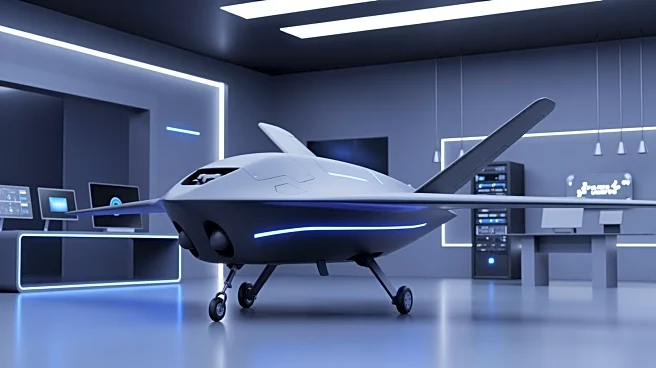What's Happening?
Boeing is set to conduct a flying demonstration of its MQ-28 Ghost Bat next year, marking a significant milestone in the development of the Australian-funded Collaborative Combat Aircraft (CCA). This demonstration will be the first time the MQ-28 is controlled
by a fighter aircraft, as announced by Alain Garcia, head of Boeing’s Korea Defense Sector, during a press conference at ADEX 2025. The MQ-28 has previously been controlled by a Royal Australian Air Force (RAAF) Boeing E-7A Wedgetail during a simulated mission. The demonstration aims to showcase the MQ-28's modularity and open architecture systems, potentially involving various fighter aircraft, including the Boeing F/A-18E/F Super Hornet, Boeing EA-18G Growler, and Lockheed Martin F-35. The MQ-28 program, initiated by the Australian government in 2017, has completed several developmental milestones, including its first flight in 2021 and flight sciences testing in 2023.
Why It's Important?
The upcoming demonstration of the MQ-28 Ghost Bat is crucial for Boeing's efforts to secure export orders for the Collaborative Combat Aircraft program. The demonstration will highlight the MQ-28's capabilities and versatility, potentially attracting interest from international defense markets. The MQ-28's modular design allows for integration with various fighter aircraft, enhancing its appeal to countries seeking adaptable and advanced unmanned combat solutions. The success of this demonstration could influence the Royal Australian Air Force's decision to operationalize the MQ-28 Block 2 by 2027, pending approval from the Australian national security committee. This development underscores the growing importance of unmanned systems in modern military strategies, offering enhanced operational flexibility and reduced risk to human pilots.
What's Next?
Ahead of the fighter-controlled demonstration, the Royal Australian Air Force plans to conduct a test involving the launch of a Raytheon AIM-120 Amraam missile from an MQ-28 Block 1 by the end of the year. This test will further demonstrate the MQ-28's combat capabilities and its potential role in future military operations. Boeing's campaign to attract export orders will likely intensify following the demonstration, with potential buyers closely monitoring the MQ-28's performance and integration capabilities. The outcome of these tests and demonstrations will play a pivotal role in shaping the future of unmanned combat aircraft and their integration into global defense strategies.
Beyond the Headlines
The MQ-28 Ghost Bat's development and demonstration reflect broader trends in military technology, emphasizing the shift towards unmanned systems and artificial intelligence in combat scenarios. The integration of such systems raises ethical and legal questions regarding autonomous decision-making in warfare. As countries invest in these technologies, discussions around international regulations and the implications of unmanned combat systems on global security dynamics are likely to intensify.















